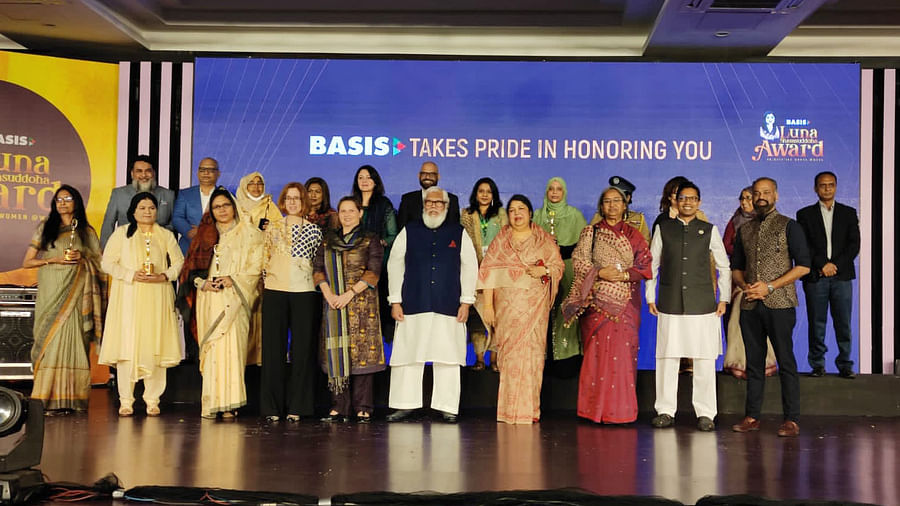ইউরোপীয় ইউনিয়ন (ইইউ)’র অর্থায়নে, ডিনেট এবং ফ্রেডরিক নওম্যান ফাউন্ডেশন ফর ফ্রিডম যৌথভাবে ‘Foster Responsible Digital Citizenship to Promote Freedom of Expression in Bangladesh’ প্রকল্পটি বাস্তবায়ন করছে। বাংলাদেশের তরুণ প্রজন্মকে দায়িত্বশীল ডিজিটাল সিটিজেন হতে সহায়তা করা এবং তাঁদের মাঝে গঠনমূলক ভাবে স্বাধীন মত প্রকাশের চেতনা গড়ে তোলার লক্ষ্য নিয়ে এই প্রকল্পের সূচনা।
এই প্রকল্পের অংশ হিসেবে, ২২ ও ২৩ মার্চ, ২০২২ ডিজিটাল সিটিজেনশিপ নিয়ে জাহাঙ্গীরনগর বিশ্ববিদ্যালয়ের শিক্ষার্থীদের সাথে বিশ্ববিদ্যালয় প্রাঙ্গনে লার্নিং সেশনের উদ্বোধন ঘোষণা করা হয়। এই দুই দিনে চারটি লার্নিং সেশনে অংশগ্রহণ করেন জাহাঙ্গীরনগর বিশ্ববিদ্যালয় থেকে ১০০ জনের অধিক কৃতি শিক্ষার্থী। মার্চ ও এপ্রিল মাস জুড়েই এই বিষয়ে শিক্ষার্থীদের সাথে পিয়ার লার্নিং কার্যক্রম চলমান থাকবে।
উদ্বোধনী সেশনে বক্তব্য রাখেন জাহাঙ্গীরনগর বিশ্ববিদ্যালয়ের সরকার ও রাজনীতি বিভাগের সহযোগী অধ্যাপক মো. ইখতিয়ার উদ্দিন ভূঁইয়া।
সেশনে আরও বক্তব্য রাখেন, ফ্রেডরিক নওম্যান ফাউন্ডেশন ফর ফ্রিডমের কান্ট্রি ডিরেক্টর উলফগ্যাং হাইঞ্জ ও প্রকল্পের প্রজেক্ট ম্যানেজার সালওয়া জাহান। অর্ধ বেলার লার্নিং সেশনগুলো পরিচালনা করেন ডিনেটের পক্ষ থেকে নিয়াজ ইসলাম আরিফ এবং সেশনটিতে সঞ্চালকের ভূমিকা পালন করেন ডিনেটের আসিফ আহমেদ তন্ময়।
লার্নিং সেশনে ডিজিটাল সিটিজেনশিপ ও মত প্রকাশের স্বাধীনতার বিভিন্ন উপাদান নিয়ে আলোচনা করা হয়। যাহা তাঁদের প্রাত্যহিক জীবনে সচেতন ও দায়িত্বশীল সিদ্ধান্ত নিতে সহায়তা করবে ও সমাজে ইতিবাচক পরিবর্তন আনতে ভূমিকা রাখবে। শিক্ষার্থীরা সেশনের বিভিন্ন কার্যক্রমে সক্রিয় অংশগ্রহণ করেন এবং নিজ জীবনে এই শিক্ষার প্রতিফলন ঘটাতে উৎসাহী হন।
এই লার্নিং সেশনে অংশগ্রহণের পর উপস্থিত শিক্ষার্থীরা মার্চ ও এপ্রিল মাস জুড়ে ডিনেট-এর তত্ত্বাবধানে তাঁদের সহপাঠীদের সাথে ২০০ এর অধিক পিয়ার লার্নিং সেশন পরিচালনা করবেন, যার প্রতিটিতে চার থেকে পাঁচজন শিক্ষার্থী উপস্থিত থাকবেন।
এই পিয়ার লার্নিং সেশনগুলোতে অন্যান্য শিক্ষার্থীরা ডিজিটাল সিটিজেনশিপ ও মত প্রকাশের স্বাধীনতা নিয়ে বিভিন্ন শিক্ষণীয় বিষয় জানতে পারবেন এবং একটি গঠনমূলক আলোচনার মাধ্যমে বিশ্লেষণধর্মী চিন্তা চর্চার পদ্ধতি সম্পর্কে জানবেন। যা তাঁদের ডিজিটাল দুনিয়ায় বিচরণের ক্ষেত্রে আচরণগত পরিবর্তন এনে একজন গর্বিত ডিজিটাল নাগরিকে পরিণত হতে সহায়তা করবে।
ফ্রেডরিক নওম্যান ফাউন্ডেশন ফর ফ্রিডমের কান্ট্রি হেড উলফগ্যাং হাইঞ্জ বলেন বাংলা (অনুবাদ), ‘ভবিষ্যতের গণতন্ত্র হবে ডিজিটাল প্ল্যাটফর্মের ওপর নির্ভরশীল। প্রবীণ জনগোষ্ঠীকে এর সাথে অভ্যস্থ করা কিছুটা দুরূহ তাই আমরা আপনাদের মতো তরুণদের নিয়ে কাজ করছি যারা সমাজে পরিবর্তন আনার মূল চালিকাশক্তি ও ভবিষ্যতের সমৃদ্ধশালী বাংলাদেশ গড়ার কারিগর।
পাশাপাশি বিশ্ববিদ্যালয়ের শিক্ষার্থীরা ডিজিটাল সিটিজেনশিপ চ্যালেঞ্জ, ২০২২-এ অংশগ্রহণ করতে পারবেন প্রকল্পের ওয়েবসাইট https://www.digitalcitizenbd.com/-এর আটটি কোর্সের কুইজে নিয়মিতভাবে অংশগ্রহণের মাধ্যমে। এই প্রতিযোগিতায় অংশ নিয়ে তাঁরা জিতে নিতে পারবেন আকর্ষণীয় বিভিন্ন পুরস্কার।
এই শিক্ষার্থীবান্ধব উদ্যোগগুলো থেকে শিক্ষার্থীরা ডিজিটাল সিটিজেনশিপ ও মত প্রকাশের স্বাধীনতা নিয়ে বিভিন্ন শিক্ষণীয় বিষয় জানতে পারবেন।
এ ছাড়াও একটি গঠনমূলক আলোচনার মাধ্যমে বিশ্লেষণধর্মী চিন্তা চর্চার পদ্ধতি সম্পর্কে জানবেন। যা তাঁদের ডিজিটাল দুনিয়ায় বিচরণের ক্ষেত্রে আচরণগত পরিবর্তন এনে একজন গর্বিত ডিজিটাল নাগরিকে পরিণত হতে সহায়তা করবে।
 +8809 6060 03638
+8809 6060 03638














